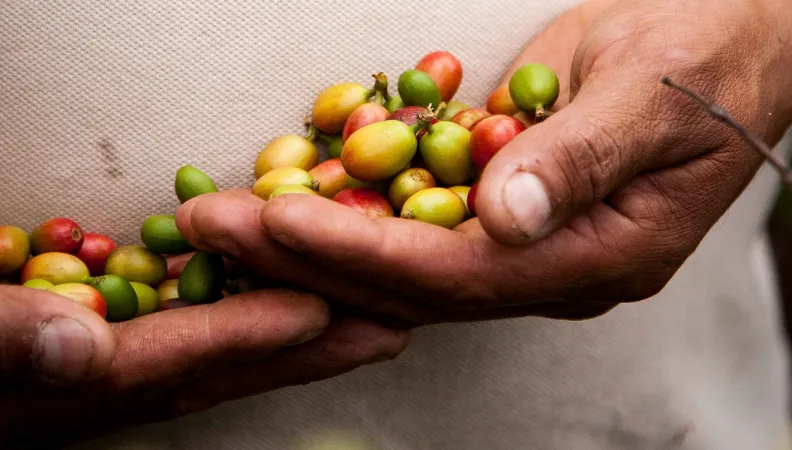Share the page
Helping Mexican Farmers Protect Coffee Crops and Improve Quality
Published on

Mexico's Chiapas state is famous for its coffee farms, but small farmers have to contend with a host of challenges, from pest control and the vagaries of global markets to the growing impact of climate change. Such difficulties adversely affect farmers’ crops and their livelihoods. AFD is supporting 3800 farmers in their effort to make coffee farming more sustainable.
In Mexico, the southern state of Chiapas, bordering Guatemala, accounts for over a third of coffee production, making it a major motor of the country’s economy and rural development. Whereas over a million people derive their livelihood from this crop, the sector has been grappling with monumental challenges for decades, from volatile prices on global markets to labor shortages, pest crises and the effects of climate change.
In an effort to counter these obstacles to producing superior-grade coffee, AFD is sponsoring a €900,000 project over three years under the auspices of the Trade Capacity Building Program (PRCC), to support seven organizations of “Smallholder Farmers of Great Coffee”. We spoke to members of one such association, Symbole Producteurs Paysans (SPP Global): Ruth Tovar, Jerónimo Prujin and Jose Fernando Rodriguez.
See also: Costa Rica: Supporting engagement against climate change
How has coffee growing evolved in recent years in Mexico, and specifically in Chiapas?
José Fernando Rodríguez: Back in the 1970s, Mexico embarked on a production policy labeled the “green revolution,” aimed at large-scale coffee production, but disregarded the environmental consequences. By the late 1980s and early 1990s global coffee prices had crashed. In response, some farmers destroyed their coffee plantations and turned their land into pasture to raise livestock, while others kept theirs, albeit at the cost of great hardship.
Despite the ensuing damages, many coffee growers and cooperatives made the best of it, while those who had always operated conventionally fell by the wayside. In Chiapas, in particular, smallholder farms were among the first to embrace sustainable, environmentally friendly farming rooted in both traditional knowledge and the farmers’ connection to nature. This was the case for organizations belonging to the SPP Global network. Mexico was one of first countries to switch to organic coffee, back in the late 1980s.
Ruth Tovar: It is worth pointing out that these organizations in Chiapas are indeed pioneers in organic farming. They started before any laws regulating organic farming were passed, and had no idea their activity was related to climate change. For them, it was more about practices reflecting a philosophy of life, their roots and their culture.
What are the emerging challenges for coffee farmers?
J. F. R.: Ensuring quality. Essentially, Mexico produces fine quality coffee, but it would only take a few adjustments to make it premium quality. Although the cooperatives have good coffee, they have been unable to make the most of it. We need to work on soil conservation, create living barriers [such as certain weeds that are “enemies” of pests], train producers in this area and look for alternative farming methods. But that is not enough. We also need to help mainstream all these new practices and harness these innovative ideas.
R. T.: Importers are becoming increasingly demanding. Today, as well as preserving the environment by producing organic coffee, we need to broaden our horizons: involve women and young people, and support them in activities that diversify their production, such as beekeeping. In the 1990s, women farmers were confined to the kitchen, but this is no longer the case. The Chiapas organizations participating in the project have made great strides on the issue of women’s access to land and economic resources.
See also: 5 flagship projects to restore nature
Jerónimo Prujin: I would also say that cooperatives need to build up their financial strength and adjust to social transformations, such as embracing digitalization. For me, however, rural challenges in Chiapas are not just about coffee.
One of the greatest challenges is getting people to understand that you can live in the countryside and live well. We need to foster a positive outlook on rural and community development. If there are opportunities in the countryside, not all young people will have to flee to the cities. Another challenge is to continue encouraging investment in the countryside so that it is not left behind. These investments will allow families relying on coffee to earn a decent income and ultimately have access to good food and health.
See also: Biodiversity protection: Key role of indigenous communities
What results are you expecting?
J. P.: We hope to see an improvement of the yield and quality of specialty coffee. It is also important to explore other activities that foster entrepreneurship and product diversification.
We also want to devise and mainstream practices that will boost resilience for communities and coffee plantations to cope with the increasingly unexpected and prolonged effects of climate change. We hope this project will become a yardstick for influencing public policy and forging alliances with a view to attracting more investment in rural areas.
